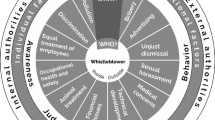Abstract
Whistleblowing, its antecedents, and its aftermath are complex and varied phenomena. Motivational factors in the perception of alleged misconduct and in the response to such allegations by the accused and the institution are examined. Understanding the psychological processes that underlie some of the surprising behavior surrounding whistleblowing will enable those who perceive wrongdoing, as well as the professional societies and work organizations which voice their concern, to better respond to apparent wrongdoing, while preserving the reputation and mental health of all parties to such cases.
Similar content being viewed by others
References
Gunsalus, C.K. (1998) Preventing the Need for Whistleblowing: Practical Advice for University Administrators, Science and Engineering Ethics 4: 75–94.
Government Accountability Project, 1402 Third Ave., Suite 1215, Seattle, WA 98101, USA. email:〈gap@whistleblower.org〉; Website: 〈http://www.halcyon.com/tomcgap/welcome.html〉
Gunsalus, C.K. (1998) How to Blow the Whistle and Still Have a Career Afterwards, Science and Engineering Ethics 4: 51–64.
Glazer, M.P. & Glazer, P.M. (1989) The Whistleblowers. Basic Books, New York.
Sprague, R.L. (1998) The Voice of Experience, Science and Engineering Ethics 4: 33–44.
Ross, L. (1977) The intuitive psychologist and his shortcomings: Distortions in the attribution process. In: Berkowitz, L., ed., Advances in Experimental Social Psychology, Vol. 10. Academic Press, New York, pp. 174–221.
Miller, A.G., Jones, E.E., & Hinkle, S. (1981) A robust attribution error in the personality domain. Journal of Experimental Social Psychology 17: 587–600.
Gilbert, D.T. & Malone, P.S. (1995) The correspondence bias. Psychological Bulletin 117: 21–38.
Reeder, G.D. (1993) Trait-behavior relations and dispositional inference. Personality and Social Psychology Bulletin 19: 586–593.
Krull, D.S. (1993) Does the grist change the mill? The effect of the perceiver’s inferential goal on the process of social inference. Personality and Social Psychology Bulletin 19: 340–348.
Jones, E.E. & Nisbett, R.E. (1972). The actor and the observer: Divergent perceptions of the causes of behavior. In: Jones, E.E., et al. (eds.) Attribution: Perceiving the causes of behavior (pp. 79–94) General Learning Press, Morristown, NJ., pp. 79–94.
Baxter, T.L. & Goldberg, L.R. (1988) Perceived behavioral consistency underlying trait attributions to oneself and another: An extension of the actor-observer effect. Personality and Social Psychology Bulletin 13: 437–447.
Johnson, J.T. & Boyd, K.R. (1995) Dispositional traits versus the content of experience: Actor/observer differences in judgments of the “authentic self.” Personality and Social Psychology Bulletin 21: 375–383.
VanHeck, G.L. & Dijkstra, P. (1985) The scope and generality of self-other asymmetry in person perception. European Journal of Social Psychology 15: 125–145.
Regan, D.T. & Totten, J. (1975) Empathy and attribution: Turning observers into actors. Personality and Social Psychology Bulletin 32: 850–856.
Ross, L., Greene, D., & House, P. (1977) The “false consensus effect”: An egocentric bias in social perception and attribution processes. Personality and Social Psychology Bulletin 13: 279–301.
Krueger, J. & Zeiger, J.S. (1993) Social categorization and the truly false consensus effect. Journal of Personality and Social Psychology 65: 670–680.
Marks, G. & Miller, N. (1987) Ten years of research on the false-consensus effect: An empirical and theoretical review. Psychological Bulletin 102: 72–90.
Mullen, B. & Riordan, C.A. (1988) Self-serving atributions for performance in naturalistic settings: A meta-analytic review. Journal of Applied Social Psychology 18: 3–22.
Seligman, M.E.P. (1975) Helplessness: On depression, development, and death. Freeman, San Francisco, CA.
Lerner, M. J. (1980) The Belief in a Just World: A Fundamental Delusion. Plenum Press, New York.
Tajfel, H. (1981) Human Groups and Intergroup Relations. Cambridge University Press, Cambridge, UK.
Kanter, R.M. & Stein, B.A. (1979) Life in organizations: Workplaces as people experience them. Basic Books, New York, pp. 259–60.
Uttal, Bro. (1983) The corporate culture vultures. Fortune, October 16, p. 66.
Torbert, W. R. (1975) Pre-bureaucratic and post-bureaucratic stages of organizational development. Interpersonal Development 5:1–25.
Milgram, S. (1974) Obedience to Authority. Harper & Row, New York.
Sarason, I.G., Sarason, B.R. & Pierce, G.R. (1990) (eds.) Social support: An iteractional view. Wiley, New York.
Seligman, M. (1990) Learned Optimism. Pocketbooks, New York.
Gamson, W.A., Fireman, B. & Rytina. (1982) Encounters with Unjust Authority. Dorsey Press, Homewood, Illinois.
Kohlberg, L. (1981) Essays on Moral Development. Vol I: The Philosophy of Moral Development: Moral Stages and the Idea of Justice. Harper & Row, San Francisco CA.
Kurtines, W. & Gewirtz, J. (1989) (eds.) Moral Development through Social Interaction. Wiley, New York.
Cited in Lazarus, R. & Folkman, S. (1984) Stress, Appraisal and Coping. Springer, New York (p. 24).
Janis, I. & Mann, L. (1977) Decision Making. Free Press, New York.
Booth, L. (1991) When God Becomes a Drug: Breaking the Chain of Religious Addiciton and Abuse, Tarcher, Los Angeles, CA.
Adler, N.E. & Matthews, K.A. (1994) Health and psychology: Why do some people get sick and some stay well? Annual Review of Psychology 45: 229–59.
Taylor, S.E. (1995) Health psychology, 3rd Ed., McGraw-Hill, New York.
Glass, D.C. (1977) Behavior patterns, sSress, and Coronary Disease. Erlbaum Associates, Hillsdale, NJ.
Krantz, D.S., Glass, D.C. & Snyder, M.L. (1974). Helplessness, stress level, and the coronary-prone behavior patterns, Journal of Experimental Social Psychology 10: 284–300.
Bowie, N. (1982) Business ethics, Prentice Hall, Englewood Cliffs, N.J. p. 143.
Author information
Authors and Affiliations
Corresponding author
Rights and permissions
About this article
Cite this article
Sieber, J.E. The psychology of whistleblowing. SCI ENG ETHICS 4, 7–23 (1998). https://doi.org/10.1007/s11948-998-0002-5
Received:
Revised:
Accepted:
Issue Date:
DOI: https://doi.org/10.1007/s11948-998-0002-5




